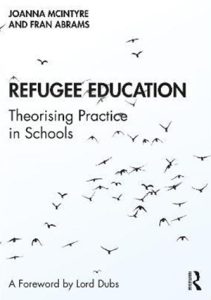Refugee Education: Theorising Practice in Schools

Author(s): Joanna McIntyre & Fran Abrams
Publisher: Routledge
Year of Publication: 2021
Print Length: 196 pages
Genre: Non-Fiction / Educational Theory and Practices, Migration & Refugee Studies
Area: England
Topic: Education, Inclusive Education, Inclusivity, Refugees & Forced Migration, Asylum & Asylum Seekers, Children & Childhood, Youth & Youthhood, Social Justice, Safety, Belonging, Success, Multiculturalism, Age and Generation, Mental Health, Wellbeing
In the last five years, more child refugees have made perilous journeys into Europe than at any point since the Second World War. Once refugee children begin to establish their new lives, education becomes a priority. However, access to high-quality inclusive education can be challenging and is a social justice issue for schools, policymakers and for the research community. Underpinned by strong theoretical framings and based on socially just principles, this book provides a detailed exploration into this ethically charged, emotive and complex subject.
Refugee Education offers an interdisciplinary perspective to critical debates and public discourse about the topic, contextualized by the voices of young refugees and those seeking to support them in and out of education. Shaped by practitioners, the book develops an inclusive model of education for refugee children based on the concepts of safety, belonging and success, and presents practical tools for planning and operationalizing the ethics of inclusive education.
This book includes a wide range of case study examples which reveal the positive outcomes that are possible, given the right inputs. It is essential reading for teachers, senior leaders and policymakers as well as academic researchers in education, social policy, migration and refugee studies.
Table of Contents
List of Figures
Acknowledgements
Foreword
1. Introduction
The rationale for the book and our approach / Jo’s work in and with schools / Fran’s investigative work on the ground / Who is this book about? / The structure of the book / References
SECTION 1: THEORISING PRACTICE IN SCHOOLS
2. Safety, belonging and success
The refugee ‘crisis’
The ‘pull’ of education
Education for all: moving beyond ‘right to rights’ towards a socially just frame
Ravi Kohli’s resumption of ordinary lives – a practical frame
The ‘search for safety’ — access and inclusion / The growth of belonging — an inclusive and equitable quality of education / The will to succeed — high-quality education and lifelong learning
Conclusion
References
3. Redistribution, recognition and representation
Moving from education as a right to education as a socially just imperative/frame for inclusion
Nancy Fraser’s participatory parity — a normative moral frame
Bringing in the moral frame
Redistribution
Recognition
Representation
Conclusion
References
BRIEF NOTE ABOUT METHODOLOGY
References
4. Education and the search for safety
Case study: Larkspur Secondary Academy
First impressions: communicating safety / A multilingual school / Safety in the Base / Becoming safe in Larkspur
Towards safety through education: debates and dialogues
Safety through the lens of participatory parity
Safety as an educational concept
References
5. Education and the growth of belonging
Case study: Jasmine Gardens Academy
First impressions: belonging to a community / Creating a culture of belonging through community
Towards belonging through education: debates and dialogues
Belonging through the lens of participatory parity
Belonging as an educational concept
References
6. Education and the concept of success
Case study: Lilac Lane Academy
First impressions: communicating success / Providing opportunities to celebrate success
Towards success through education: debates and dialogues
Success through the lens of participatory parity
Succeeding as an educational concept
References
7. A bespoke model of inclusive education for new arrivals
First impressions: a mini-portrait of life at Fern / Setting the context, establishing the moral frame / A curriculum for safety, belonging and success / Safety / Belonging / Success / Conclusion / References
SECTION 2: CONTEXTS
Brief note about approach / Yusuf: ‘A boy looking in two directions’
8. A historical narrative of refugee education in England
Seventeenth century: Huguenots / Nineteenth century: Jews / 1930s: Basques / Wartime: Jews / After the war: Poles / 1970s: A move towards multiculturalism / Ugandan Asians / Vietnamese / Conclusion / References / Abdul: ‘I just wanted to find a safe place and find a better life, and to have equality’
9. On the ground: The East of England
10. Policy environment — England
Introduction
Legislation affecting new arrivals
Funding
Enabling factors
Linguistic support
Admissions systems and segregation
Advice and guidance
External factors
Too old for school? The role of age and age assessments
Mental health issues
Conclusion
References
Hamid Khan: ‘Education is the light that brightens your mind’
SECTION 3: WAYS FORWARD
11. Concluding thoughts
Principles for policy and practice
Implications for practice, policy and future research
Call to action
References
Index

Joanna McIntyre is Associate Professor in the School of Education, University of Nottingham. She has worked on a range of funded research projects in the fields of teacher education and refugee education and is particularly interested in how, through the field of Education, we can understand and improve the lives of those who are marginalized or disadvantaged by society. Jo chairs the Russell Group’s Initial Teacher Education national network. She sits on the DfE’s Initial Teacher Training Advisory Group and is a member of UCET’s Executive Committee. Jo’s work in the field of refugee education includes a sustained collaboration with Lund University. She has worked on research projects which look at the barriers and opportunities schools face when working to support refugee children in Europe. This has included work with teacher educators in different international contexts to consider issues of global migration and initial teacher education.
Source: https://www.education.ox.ac.uk/people/joanna-mcintyre/
More from Joanna McIntyre in this library, click here.

Fran Abrams is a journalist and an author. She began reporting on education for the Birmingham Post and Mail in 1988, and went on to be Education Correspondent of the Sunday Times, the Sunday Correspondent, the Sunday Telegraph and the Independent. She later worked as Westminster Correspondent of the Independent. For the past 15 years she has been part of the reporting team on BBC Radio 4’s File on 4 programme as well as writing articles on education for The Guardian and a range of other publications. Fran is now Chief Executive for The Education Media Centre, a charity run by journalists and dedicated to ‘making evidence make news.’ They aim to help build a stronger, more evidence-based education system by ensuring good research has a high profile in the media.
Source: https://theedtechpodcast.com/speaker/fran-abrams/
More from Fran Abrams in this library, click here.
